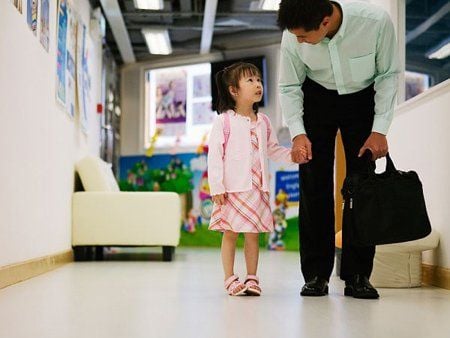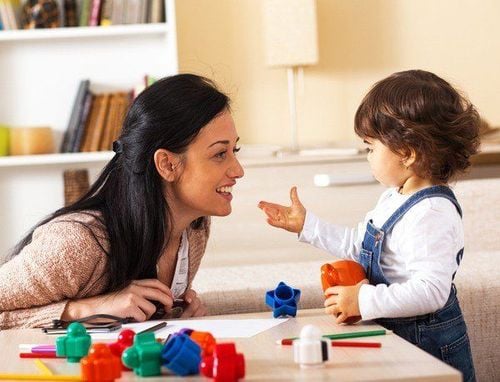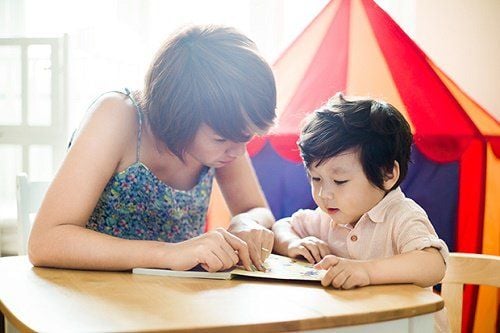This is an automatically translated article.
Adjusting to kindergarten can be difficult for any child, even those who have been in kindergarten for a while. To prepare your child for kindergarten, it is important that you create a fun prep time and should not stress learning with children at this age. So, what do children need to prepare for school?
1. Plan more social activities
All preschool children must get along with other children. If your child doesn't spend a lot of time in groups with other children, activities like sharing, taking turns, and cooperative play can be challenging.
Help your child get used to being part of a group by setting up a play space with one or two peers or enrolling them in a music or sports class.
2. Encourage children to go to school
Very rarely does a child not have some anxiety when starting kindergarten . You can encourage your child to say things like "When I was dad, going to school was the most enjoyable thing" or "You have nothing to fear" and never downplay your child's fears or concerns. Instead, help them allay their fears with the information you convey in the most enjoyable ways.

Bố mẹ nên dành thời gian trò chuyện và động viên trẻ đến trường
Talk to your child about what will happen when he or she goes to school, where he will go, what he will do and who will be in the same class as him. Before class begins, visit the classroom together at least once, preferably when other children and their prospective teacher are present.
3. Make a habit of saying goodbye
If this is the first time your child is away from you, he or she may worry that you won't come or that you will get lost and won't be able to find your way back to school to pick them up at the end of the day. Do some special parting moves such as a high-five or say something like, "I'll be back to see you soon," which you do every time you drop your child off at school.
During the first few days, spend extra time getting your child ready for school in the morning. If things go well at home, it's easier when your child is away from you at school, and while you may have to find ways to keep your child in school when you drop them off at the school gates, experts advise against it. do like that. The reason is that the child will only suffer more when he realizes that you have left him.
Instead, say goodbye and don't stay with the child for too long. You should talk to your child gently and normalize going to school so that the child understands and feels how you behave.

Hãy nói lời tạm biệt và không ở lại với trẻ quá lâu
4. Read to your child every day
Most kindergarten classes have at least one reading period per day. Dedicating at least 15 minutes a day to reading time will make this habit familiar to children when they start school. Children who are not experienced with reading reading early on are often more difficult to learn to read later. Since preschoolers cannot read on their own, they need to learn to listen. Reading aloud to your child is a great way to help develop listening skills.
When your child begins to remember phrases, ask them to "read" with you. For example, if you read The Three Little Pigs, after the wolf says, "Pig, let me in," have your child continue the story, "No way, no way."
Your child will also learn to predict the outcome of a story in preschool. To help your child prepare for this, you can stop halfway through reading and ask him what he thinks will happen next or how he thinks the story will end.
5. Practice listening skills
Kindergarten teachers often encourage younger students to sit still and listen. You can help your child prepare for this request by occasionally asking him to sit quietly with his eyes closed, and then ask him to tell you all the sounds he just heard. Ask the child who, what animal, or what makes the sound and where the sound is coming from.
In kindergarten, children also learn to listen and follow the teacher's instructions. Start asking your child to do a series of activities, such as putting their shoes in the room and putting them in the closet. Or go to the bathroom and wash your hands, then help you set the table.

Bạn có thể giúp trẻ chuẩn học cách lắng nghe và làm theo hướng dẫn trước khi đi học mẫu giáo
You can also play games that require your child to listen carefully to instructions, solve problems, and follow instructions sequentially.
Children in the period from 6 months to 3 years old are very susceptible to respiratory problems, respiratory infections, skin diseases and gastrointestinal infections... parents need special attention attention to the care and provision of adequate nutrition for children.
Children who do not eat properly are at risk of micro-mineral deficiency causing anorexia, growth retardation, malabsorption,... If they notice the above signs, parents should supplement their children with products. The supplement contains lysine, essential micro-minerals and vitamins such as zinc, chromium, selenium, and B vitamins to help fully meet the nutritional needs of children. At the same time, these essential vitamins also support digestion, enhance nutrient absorption, help improve anorexia, and help children eat well.
Parents can learn more:
Signs of zinc deficiency in children
Micronutrient deficiency and failure to gain weight in children
Please regularly visit Vinmec.com website and update useful information to take care of your child. Take care of the baby and the whole family.
Reference source: babycenter.com













